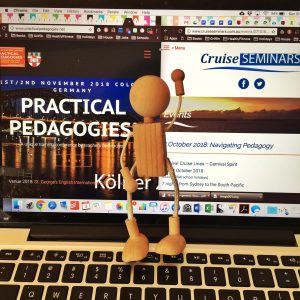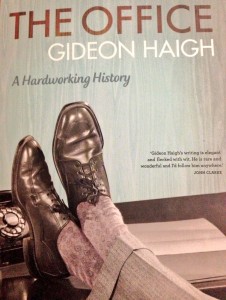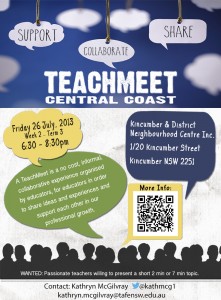In Business Studies students learn about Managing change effectively. They look at how a business must:
- Identify the need for change
- Set achievable goals
- Deal with resistance to change
The business may also engage management consultants to help it through this process.
To meet these outcomes I asked students to write a business report about a change they would like to see in their school. My favourite (reproduced without corrections) is advocating student involvement in the hiring of teachers:
Introduction
This report will discuss the processes that are required for a positive change at Northern Beaches Christian School. The positive change that is considered is the idea of having student input in the process of hiring staff. This report will identify the need for the change, set achievable goals, and discuss dealing with resistance to change. It will also list all the consultants that would be needed to implement the change and address how stakeholders of the school would be affected by the change. The report will conclude with a recommendation on how the change could be implemented and the benefit to the school.
This report is being written because a recent study has concluded with the results that students work harder, more efficiently and have the will and right attitude to work because of the teacher that is teaching them and the way they teach. Therefore, from large amount of student support it is necessary that this change is implemented one way or another, because ultimately it is the students being taught and therefore why not hire a teacher that they approve of?
Identifying the need for change
An effective principal would always be scanning the environment, attempting to understand factors that will have an impact on their school. In this way, they may better identify current trends and predict future changes. Achieving such a vision requires a holistic view of the school community and awareness of the potential impact on the business from a variety of factors. Correctly anticipating these factors greatly assists the principal in identifying the need for change. To better understand the changes that need to occur, the principal needs access to accurate and up-to-date information. This would include the recent study completed, which investigated the impact a teacher had on the work completed by their students, and included how the students worked as well. From this it seen that that the way students work is largely impacted by their teachers, which includes their drive, ambition, will and efficiency. For example, an enthusiastic, innovative teacher that explain concepts in a way that everyone understand would definitely have a positive impact on students work ethic than a teacher that reads out from the text book and orders students to answer questions from the textbook. Therefore, for the benefit of the school, it would be better for students to have an input because it is them that are learning and they should have an input on who teaches them.
Set achievable goals
Usually goals are directed towards the employees of a business, however in this case, as the change is directed towards future employees and the senior executives and the principal of the school, it is they that the goals will be directed towards. A vision statement for the proposed change must also be created as it states the purpose of the change, indicates how the future employees should act and states the key goals.
Vision Statement:
To have student input in the hiring of staff, as they are the people who are being taught and therefore must be able to choose preferences for the best learning experience possible. All future employees must be focused, enthusiastic, innovative and have exceptional communication skills.
Key goals include:
- Having students participate in the interview with the future employee and principal.
- Having future employee being assessed by students and senior executive in a practice lesson.
- Having a questionnaire created by students that is to be completed by the future employee and having questions such as what drives and motivates them, why are they enthusiastic about teaching, why approach this particular school, what teaching style do they think they possess.
- After all of the above has occurred, students should sit with the principal and senior executives, for the final discussion of their position.
Measureable goals include:
- Having different but same number of students at each interview, practise lesson, final discussion, etc.
- Creating a system on how and which students would be chosen to participate in this important selection.
- Having an assessment created for the practise lesson, to which the LAM would be marking them off.
Deal with resistance to change
With any amount of change, there would always be some resistance from teachers, senior executives and even the principal themself. The common reasons to why they would resist change include:
- Disruption of routine. They may resist change because they are worried that they cannot adapt to the new procedures that threaten established work routines.
- Time. In some circumstances, not enough time is allowed for people to think about the change, accept it and then implement it. In other situations, the timing is poor.
- Inertia. Some managers and employees resist change because it requires moving outside and away from their ‘comfort zones’. In this case, it would include having student input in a normally senior executives and principal area, and the future employee would think that students would take advantage of their position and negatively use it.
Resistance to change can be dealt with having strategies put in place. The first step in reducing resistance to change is to ensure that the senior executives and principal understand to main reasons why change is resisted. Once these factors have been identified, each senior executive can put in place strategies to reduce the resistance. Two of the most effective are creating a culture of change and positive leadership.
Culture of change: A strategy includes having the school identify individuals who could act as supportive change agents, which are people who act as catalysts, assuming responsibility for managing the change process. This could also not be possible without the strong communications of the leaders and the encouragement of teamwork.
Positive leadership: A principal who acts as a leader and has high expectations of employee’s abilities to initiate and implement a change process would generally be rewarded with people who are willing to embrace change. There may still be some points of resistance, but this resistance can be productively dealt with because the employees believe that they have the support and trust of their principal.
The consultants that would be needed to implement the change
To implement the change, the consultants that would be needed are:
- Education consultants-who help people that want to find a career in teaching. They would be used to inform those who want to teach at Northern Beaches Christian School about how they would apply at the school and the processes they would need to undertake before being hired.
- Management consultants, which are people who have specialised skills within an area of business. They can provide further strategies to smoothly manage the introduction of business changes by:
- Undertaking change readiness reviews
- Creating a supportive business culture
- Actively involving all stakeholders in the changing process
- Gaining and recognising early achievements.
How stakeholders of the school would be affected by the change
Students: They would be positively affected, as their valuable input in teacher hiring would be recognised, and they would feel as if they making the school better for everyone.
Teachers: Depending on the person, they would be either negatively or positively affected because those that were teaching before the change was implemented, would believe that the students do not like them and positively because of the benefit to the school.
Principal: They would be positively affected because it is new innovation that the school could embrace, especially giving the students an active role in the development of the school.
Senior executives: With the support from the principal they would be positively affected by the change because they have student opinion on a very important decision.
Parents: They would be positively affected because they would know that their children would be more engaged, focused and enthusiastic about learning because they have a teacher that they like and work better with.
Community: The school community would be positively affected because of the development of the school and would be supportive about students having more responsibility by having an input about teacher hiring.
People considering to be hired: The change would bring more pressure upon themselves, however a great teacher would learn how to use the pressure and turn it into an advantage for themselves.
Conclusion
It can be concluded that implementing the change of having student input in the hiring process of teacher is beneficial to the school. It is recommended that this change occur gradually with a systematic approach, to be created by the principal and management consultants, with education consultants being informed about the change, so they could inform those wanting to be hired about the processes to being hired. This change will be beneficial to the school because it gives students a place where their input is valued and used for very important decisions. As the principal wants to be innovative, this change is one more step towards it and the future development of the school.










